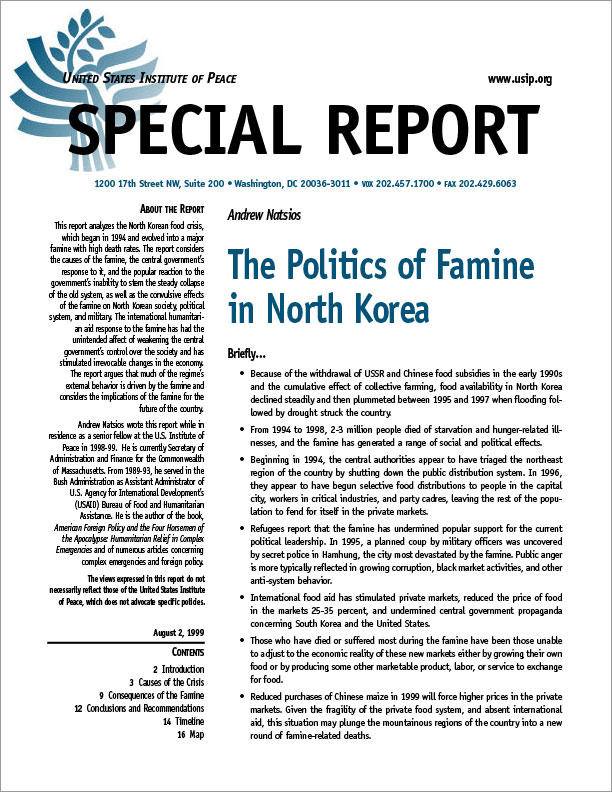The Politics of Famine in North Korea

Summary
- Because of the withdrawal of USSR and Chinese food subsidies in the early 1990s and the cumulative effect of collective farming, food availability in North Korea declined steadily and then plummeted between 1995 and 1997 when flooding followed by drought struck the country.
- From 1994 to 1998, 2-3 million people died of starvation and hunger-related illnesses, and the famine has generated a range of social and political effects.
- Beginning in 1994, the central authorities appear to have triaged the northeast region of the country by shutting down the public distribution system. In 1996, they appear to have begun selective food distributions to people in the capital city, workers in critical industries, and party cadres, leaving the rest of the population to fend for itself in the private markets.
- Refugees report that the famine has undermined popular support for the current political leadership. In 1995, a planned coup by military officers was uncovered by secret police in Hamhung, the city most devastated by the famine. Public anger is more typically reflected in growing corruption, black market activities, and other anti-system behavior.
- International food aid has stimulated private markets, reduced the price of food in the markets 25-35 percent, and undermined central government propaganda concerning South Korea and the United States.
- Those who have died or suffered most during the famine have been those unable to adjust to the economic reality of these new markets either by growing their own food or by producing some other marketable product, labor, or service to exchange for food.
- Reduced purchases of Chinese maize in 1999 will force higher prices in the private markets. Given the fragility of the private food system, and absent international aid, this situation may plunge the mountainous regions of the country into a new round of famine-related deaths.
About the Report
This report analyzes the North Korean food crisis, which began in 1994 and evolved into a major famine with high death rates. The report considers the causes of the famine, the central government's response to it, and the popular reaction to the government's inability to stem the steady collapse of the old system, as well as the convulsive effects of the famine on North Korean society, political system, and military. The international humanitarian aid response to the famine has had the unintended affect of weakening the central government's control over the society and has stimulated irrevocable changes in the economy. The report argues that much of the regime's external behavior is driven by the famine and considers the implications of the famine for the future of the country.
Andrew Natsios wrote this report while in residence as a senior fellow at the U.S. Institute of Peace in 1998-99. He is currently Secretary of Administration and Finance for the Commonwealth of Massachusetts. From 1989-93, he served in the Bush Administration as Assistant Administrator of U.S. Agency for International Development's (USAID) Bureau of Food and Humanitarian Assistance. He is the author of the book, American Foreign Policy and the Four Horsemen of the Apocalypse: Humanitarian Relief in Complex Emergencies and of numerous articles concerning complex emergencies and foreign policy.
The views expressed in this report do not necessarily reflect those of the United States Institute of Peace, which does not advocate specific policies.



